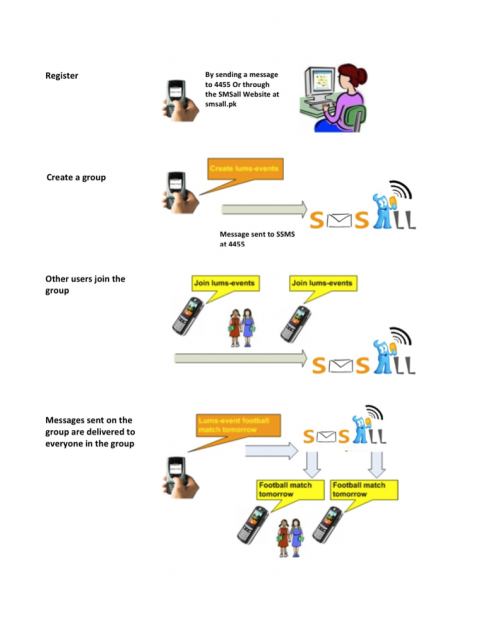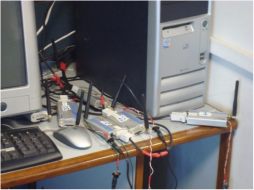SMSall is a service in Pakistan that enables mailing-list style interaction over SMS. It serves over 2.1 million people, and an average of 300 million SMS messages are sent every month (follow the total SMS count on the website). It is Pakistan’s largest SMS social network.
The founder of the service, Umar Saif, refers to it as “Twitter for SMS,” or as “Twitter for the 4 billion,” referring to the 4 billion people in the world who have access to mobile phones but not the Internet.
SMSall formed in response to the 2005 Kashmir earthquake in Pakistan. Like most Pakistani’s, Saif said, he tried to help during the aftermath but realized that although there were many rescue workers, there was no way to coordinate activities. “You would travel to a remote region with medicine, only to realize that there is plenty of medicine and all they needed were tents and warm clothing,' he said.
So Saif took action. On his laptop, he hacked together a basic response service, connected a mobile phone, and set up a broadcast group for all the rescue workers in the area. Those who subscribed to the “rescue group” would then receive SMS messages and information from the entire group.
From this grew the current-day SMSall service, the largest SMS social network in Pakistan. MobileActive.org spoke with Saif to hear more about the growth and next steps for the SMS service.
How does it work?
With the Kashmir earthquake, people could send an SMS to the service and ask to subscribe to the rescue group. Subsequently, they would receive SMS messages from everyone who posted to the rescue channel. This way, rescuers could keep in contact, in real-time, with only a basic mobile phone.  Now, SMSall users can create a group, join a group, follow a group, and broadcast to a group. The service has been used to spur blood donations, to communicate emergency responses, and to mobilize citizens in political protests. The service is used both by NGOs and more informally by people to keep in touch with friends and build communities around common interests.
Now, SMSall users can create a group, join a group, follow a group, and broadcast to a group. The service has been used to spur blood donations, to communicate emergency responses, and to mobilize citizens in political protests. The service is used both by NGOs and more informally by people to keep in touch with friends and build communities around common interests.
SMSall became a popular platform for communication during media bans at the end of Musharraf’s rule. Political activists and members of civil society used SMSall to coordinate protests and activities. “One of the biggest groups on SMSall was run by an NGO setup by families of “missing persons” -- people who disappeared without trace during the political upheaval that gripped Pakistan in 2007 and 2008,” Saif said.
When a disaster or breaking news event occurs, specific groups form almost organically. An SMSall user will first notify an established group of friends and family, and from these many simultaneous chats, specific disaster or emergency groups are often formed, Saif said. The service resembles Twitter in that messages are being “pushed” out and viewed by any number of followers. Currently, there are over over 150,000 established groups on SMSall in Pakistan.
During the early days of SMSall, it was used to coordinate class quizzes and exams and communicate course schedules at Lahore University of Management Sciences (LUMS). Saif worked with several students to tweak the system and used it in a course he taught. Other professors followed his lead, students started using it, and “before we knew it, the system went viral, very quickly,” Saif said. SMSall is currently used by over 180 colleges and universities in Pakistan. And from this grew the “SMS mailing list” in Pakistan.
SMSall User Costs
For the first 3 years, the SMSall service was free for users. But, sustaining this model became difficult as millions of people joined, Saif said. Now, a user purchases credit via SMS, which amounts to 1 Pasia (0.01 Pakistan Rupee or PKR) per SMS (or less than 1 cent USD). Users can recharge credit and are offered bonus credits as they use the service.
But, Saif said, this fee has not affected traffic and use of the service. “Traffic just keeps increasing every day.” Pakistan is a very suitable environment for the service, as text messaging is already a popular form of communication: last year, over 103 billion SMS messages were sent in Pakistan, Saif said, making it among the countries with the highest SMS traffic in the world.
Meaningful conversations
Meaningful conversations are important to Saif and the SMSall team. “That is something that we worry about every day: how to maintain the quality of traffic,” he said.
There are “bells and whistles” in place to help ensure quality group content, and the majority of moderation happens via the SMSall community itself. Within a group, messages can be flagged, just as in an Internet chat room.
If a specific user is flagged enough times, Saif said, they can be suspended from the service. SMSall also has strong spam filters in place as well as limits on how many messages someone can send. Combined with community monitoring, the SMS conversations remain meaningful, Saif said.
“It’s almost unprecedented to have a small SMS service grow to this scale,” Saif said. “And we are only beginning to invent a lot of interesting things,” including more spam filters and commenting features. Some of this can be replicated, but some is novel. Saif is a university professor and also sees an opportunity for academic research on how people interact and use the system, especially on how specific groups are created and named.
Conversations are happening in multiple languages, including Sindhi, Punjabi, Balochi, and English. In Iraq, where the service just launched, people are using Arabic language and characters to communicate over SMSall.
Mobile providers: Everyone is on board
Initially, Saif ran the service by connecting five mobile phones to a computer. With this configuration, the service could handle about 60 SMS messages per minute. Saif then added phone after phone as the number of users and messages continued to grow. When he reached 20 mobile phones, Saif could not handle the number of messages. It was then that he approached and established relationships with mobile providers in Pakistan.
SMSall is the only SMS service in Pakistan that operates over all mobile networks. The short code is the same number across all mobile providers, and for each message sent across a given network, the mobile provider receives a percentage of the SMSall fee (ranging between 30 and 40 percent).
SMSall now employs a technical team of 5 people. Initially, SMSall was an open source platform. But as the service grew, Saif built a proprietary platform.
SMSall is constantly negotiating with mobile operators for more capacity, because it turns out, “whatever capacity afforded the system is very quickly consumed by our users,” Saif said.
And growing it is: SMSall recently signed contracts to begin service in Iraq, Kenya, and Bangladesh -- all areas with significant mobile penetration and limited personal access to the Internet.
But Saif isn’t focused on the number of users. “We want to be a catalyst for change,” he said.
For more, watch this video interview with Saif on Pakistan’s The Morning Show. Saif was also selected as a Young Global Leader by the World Economic Forum in 2010 and helped co-found SeenReport, a citizen journalism service in Pakistan.
Photos courtesy of Umar Saif.
| SMSall: The Largest Group “SMS Mailing List” in Pakistan data sheet 5193 Views | |
|---|---|
| Countries: | Pakistan |


Post new comment